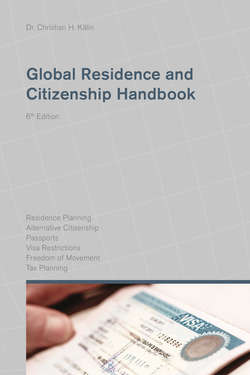Читать книгу Global Residence and Citizenship Handbook - Christian H. Kälin - Страница 43
На сайте Литреса книга снята с продажи.
Real estate holding structures
ОглавлениеIn some situations, it is sensible to use a holding structure such as a company for fiscal and succession planning or to avoid restrictions or licensing requirements. There are also other factors which will dictate whether a property should be held in a holding structure. In many cases, the decision will be determined by the specific country in which the individual is purchasing the property as each country’s specific regulations will have a different effect on their tax and succession planning.
In addition to tax and succession planning aspects, it is also desirable, for confidentiality and asset protection purposes, to hold real estate via the intermediary of a company rather than directly, as this prevents the effective owner from appearing in the ownership or land register.
The more expensive the real estate, the more sense it makes to use a holding structure rather than place the asset in the individual’s name.
However, in some circumstances it is preferable to acquire the real estate directly in one’s own name. Firstly, for example in France, comprehensive regulations aim to prevent acquisition via the intermediary of companies and thus make such procedures more complicated – with the notable exception of the domestic SCI.16 Secondly, this can even have tax disadvantages, as companies are often liable to higher capital gains tax than directly owned properties at a resale. Furthermore, most companies (again perhaps with the exception of a French SCI) incur administrative costs. In many countries it therefore makes more sense to acquire properties in the lower to middle price range directly in one’s own name. However, careful planning is of particular importance in such cases, and includes drawing up a suitable will or possibly also acquiring the property in the name of your children.
The use of a holding structure has differing effects in the various jurisdictions. Therefore it is important to understand the implications of the residence status and the local tax and succession laws. Often, companies are usually set up in countries where company taxes are nil or limited and annual maintenance costs are low. Such jurisdictions include Anguilla, the BVI, Luxembourg, Malta and Panama, where companies can be set up and maintained at low cost and with no or only limited local tax consequences. However, tax consequences may have to be taken into account depending on the country of residence of the company owner and the country from where the company is effectively managed. So it is essential to clarify all circumstances and tax consequences carefully – including in the country where the company owner is resident.
It is also worth noting that corporate and other holding structures (such as private foundations and trusts) are often recommended and also implemented despite failing to pass a thorough scrutiny by the relevant tax authorities – where such scrutiny takes place. Many countries have now extended their relevant tax laws with very extensive anti-abuse regulations. If more than 50% of a company’s assets consist directly or indirectly of real estate, that company will often be taxed just like real estate. Thus the capital gain from the sale is also taxed on the same basis (and cannot simply accrue tax free in a zero tax country) when the responsible tax authorities discover the true nature of the transfer. Ultimately, many company structures are based on the transfer of company shares without the notification of the tax authorities. Although it is often highly unlikely that the tax authorities will ever find out about the transaction, it cannot form the basis of a legal arrangement and sound planning.
In 2012, new rules relating to dwellings worth over GBP 2 million held by corporate structures came into force in the UK, making it essential to take professional advice if you own, or are considering investing in, valuable real estate in the UK.
